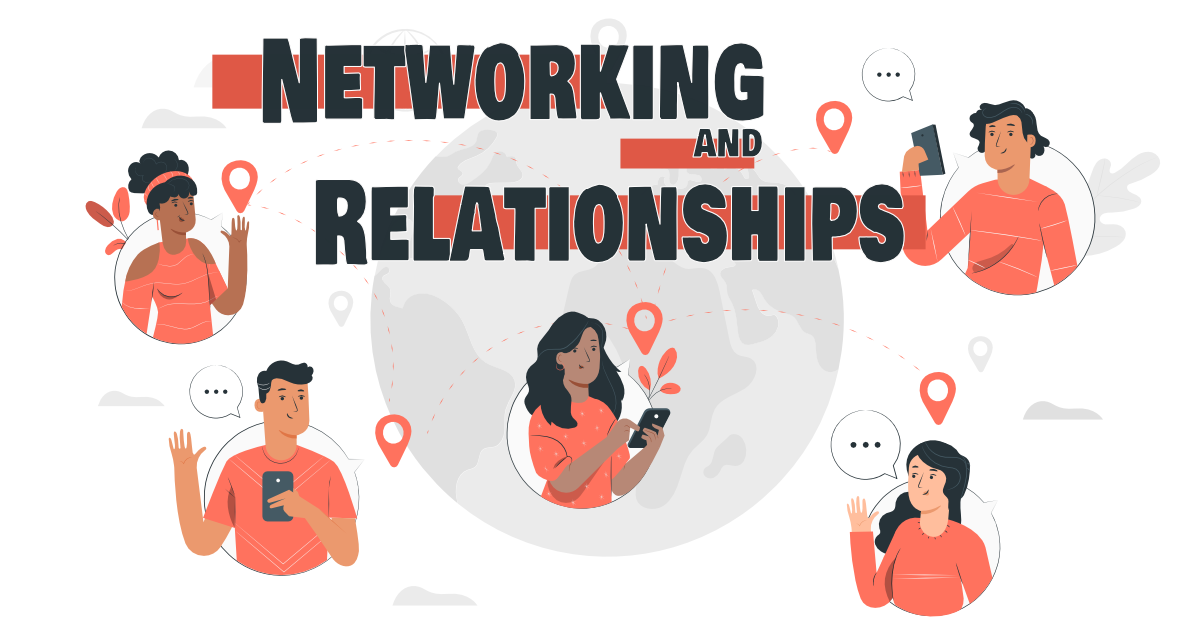Networking and building relationships are key elements of a successful marketing and sales strategy for small businesses. By developing a strong network of contacts, small business owners can gain valuable insights, access new markets, and create mutually beneficial partnerships. In this section, we will explore the various ways small business owners can use networking and relationship building to boost their marketing and sales efforts. From attending networking events and joining industry organizations to leveraging social media and building partnerships with other businesses, we will cover a wide range of strategies and best practices for building a strong network and expanding your reach as a small business owner.
Identifying networking opportunities
Networking is a vital aspect of building relationships and growing a small business. However, it can be difficult to know where to begin when it comes to identifying networking opportunities. In this article, we will explore various strategies for identifying networking opportunities and discuss the benefits of different types of networking events.
Attending Industry Events
One of the most effective ways to identify networking opportunities is by attending industry events. These events bring together professionals from your industry, giving you the opportunity to meet and connect with potential customers, partners, and other industry leaders. Trade shows, conferences, and networking events are all great places to start. For example, if you own a small business that sells handmade jewelry, attending a craft fair or a jewelry trade show can be a great way to connect with other jewelry designers and potential customers.
Joining Professional Organizations
Another great way to identify networking opportunities is by joining professional organizations. These organizations provide resources, training, and networking opportunities for professionals in your industry. Joining a professional organization can be a great way to connect with other industry professionals and gain valuable insights into your industry. For example, if you own a small business that provides accounting services, joining a professional organization for accountants can be a great way to connect with other accountants and gain access to industry-specific resources.
Leveraging Social Media
Social media platforms like LinkedIn, Twitter, and Facebook can also be used to identify networking opportunities. By connecting with other industry professionals, you can gain access to valuable industry insights and connect with potential partners, customers, and other industry leaders. For example, if you own a small business that provides marketing services, connecting with other marketing professionals on LinkedIn can be a great way to connect with potential customers and partners.
Partnering with Other Businesses
Partnering with other businesses can be a great way to identify networking opportunities. By forming strategic partnerships with other businesses, you can gain access to new markets and resources, and connect with potential customers and partners. For example, if you own a small business that sells organic produce, partnering with a local grocery store can be a great way to connect with potential customers and expand your reach.
In conclusion, identifying networking opportunities is an important aspect of building relationships and growing a small business. By attending industry events, joining professional organizations, leveraging social media, and partnering with other businesses, small business owners can connect with potential customers, partners, and other industry leaders. By utilizing these strategies, small business owners can gain valuable insights, access new markets, and create mutually beneficial partnerships.
Setting networking goals
Networking is an important aspect of growing a small business, but it can be difficult to know what to achieve through networking without clear goals. Setting networking goals can help small business owners focus their efforts, measure their progress, and achieve the desired outcomes. In this article, we will explore the importance of setting networking goals and discuss strategies for creating effective networking goals.
Why Setting Networking Goals is Important
Setting networking goals is important for small business owners because it helps them stay focused and measure their progress. Without clear goals, it can be difficult to determine whether networking efforts are paying off. Setting goals also helps small business owners stay motivated and stay on track. For example, if a small business owner set a goal to connect with at least 10 potential customers at a networking event, they can measure their progress and determine if they are on track to meet their goal.
Creating Effective Networking Goals
Creating effective networking goals starts with understanding what you want to achieve through networking. Small business owners should focus on goals that align with their overall business objectives. For example, if a small business owner wants to expand their customer base, a goal to connect with at least 10 potential customers at a networking event would align with their business objective.
When creating networking goals, small business owners should also consider the different types of networking opportunities available. For example, attending industry events, joining professional organizations, leveraging social media, and partnering with other businesses can all provide different opportunities for networking. Small business owners should create goals that take advantage of the different networking opportunities available.
Networking goals should be specific, measurable, and achievable. For example, a specific goal would be “connect with at least 10 potential customers at a networking event”, a measurable goal would be “increase sales by 15% within the next 6 months” and an achievable goal would be “attend at least 2 networking events per month”.
Examples of Networking Goals
- Attend at least 2 networking events per month
- Connect with at least 5 potential partners at industry events
- Increase social media followers by 20% within the next 6 months
- Set up at least 3 meetings with potential customers per month
- Partner with at least 2 other businesses within the next year
In conclusion, setting networking goals is an important aspect of growing a small business. By setting specific, measurable, and achievable goals, small business owners can focus their efforts, measure their progress, and achieve the desired outcomes. By utilizing these strategies, small business owners can gain valuable insights, access new markets, and create mutually beneficial partnerships.
Building a professional network
Building a professional network is an important aspect of growing a small business. A strong network of contacts can provide valuable insights, access to new markets, and opportunities for mutually beneficial partnerships. In this article, we will explore strategies for building a professional network and discuss the benefits of different types of networking relationships.
Networking at Events
Attending industry events and networking events is a great way to meet other professionals in your industry and build relationships. These events provide opportunities to connect with potential customers, partners, and other industry leaders. For example, if you own a small business that sells handmade jewelry, attending a craft fair or a jewelry trade show can be a great way to connect with other jewelry designers and potential customers.
Joining Professional Organizations
Joining professional organizations is another great way to build a professional network. These organizations provide resources, training, and networking opportunities for professionals in your industry. For example, if you own a small business that provides accounting services, joining a professional organization for accountants can be a great way to connect with other accountants and gain access to industry-specific resources.
Leveraging Social Media
Social media platforms like LinkedIn, Twitter, and Facebook can also be used to build a professional network. By connecting with other industry professionals, you can gain access to valuable industry insights and connect with potential partners, customers, and other industry leaders. For example, if you own a small business that provides marketing services, connecting with other marketing professionals on LinkedIn can be a great way to connect with potential customers and partners.
Partnering with Other Businesses
Partnering with other businesses can be a great way to build a professional network. By forming strategic partnerships with other businesses, you can gain access to new markets and resources, and connect with potential customers and partners. For example, if you own a small business that sells organic produce, partnering with a local grocery store can be a great way to connect with potential customers and expand your reach.
Building Strong Relationships
Building strong relationships is essential for a successful professional network. This means actively maintaining your relationships, being responsive and reliable, and providing value to your network. Building a professional network takes time and effort, but it can have a significant impact on the growth and success of your small business.
In conclusion, building a professional network is an important aspect of growing a small business. By attending industry events, joining professional organizations, leveraging social media, and partnering with other businesses, small business owners can connect with potential customers, partners, and other industry leaders. Building strong relationships and actively maintaining them is key to a successful professional network. By utilizing these strategies, small business owners can gain valuable insights, access new markets, and create mutually beneficial partnerships.
Building relationships through social media
Social media has become an important tool for small businesses to connect with customers, partners, and other industry leaders. Building relationships through social media can provide valuable insights, access to new markets, and opportunities for mutually beneficial partnerships. In this article, we will explore strategies for building relationships through social media and discuss the benefits of different types of social media platforms.
Choosing the Right Platforms
When building relationships through social media, it is important to choose the right platforms. Different platforms serve different purposes and attract different audiences. For example, LinkedIn is a professional networking platform, while Instagram is a visual platform that is best for sharing photos and videos. For small business owners, it is important to identify which platforms will be the most beneficial for their business.
Creating a Strong Profile
Creating a strong profile is essential for building relationships through social media. This means including a professional headshot, a detailed bio, and relevant information about your business. A strong profile will make it easier for other industry professionals to find and connect with you.
Networking with Industry Professionals
Once you have set up your profile, it is time to start networking with industry professionals. This can be done by connecting with other professionals on the platform, joining groups relevant to your industry, and participating in conversations. For example, If a small business owner that provides marketing services, connecting with other marketing professionals on LinkedIn can be a great way to connect with potential customers and partners.
Sharing Valuable Content
Sharing valuable content is a great way to build relationships through social media. This can be done by sharing relevant industry news, tips, and best practices. By sharing valuable content, small business owners can establish themselves as thought leaders in their industry and attract potential customers and partners.
Engaging with your Audience
Engaging with your audience is important for building relationships through social media. This can be done by responding to comments and messages, and actively participating in conversations. Engaging with your audience helps to build trust and establish a connection with your followers.
In conclusion, building relationships through social media is an important aspect of growing a small business. By choosing the right platforms, creating a strong profile, networking with industry professionals, sharing valuable content and engaging with your audience, small business owners can connect with potential customers, partners, and other industry leaders. By utilizing these strategies, small business owners can gain valuable insights, access new markets, and create mutually beneficial partnerships.
Utilizing professional associations and industry events
Professional associations and industry events are great resources for small business owners looking to build relationships and gain valuable insights into their industry. These organizations and events provide networking opportunities, training, and resources for professionals in a particular industry. In this article, we will explore strategies for utilizing professional associations and industry events and discuss the benefits of participating in these organizations and events.
Joining Professional Associations
Joining professional associations is a great way to build relationships and gain valuable insights into your industry. These associations provide resources, training, and networking opportunities for professionals in your industry. For example, if you own a small business that provides accounting services, joining a professional association for accountants can be a great way to connect with other accountants and gain access to industry-specific resources.
Attending Industry Events
Attending industry events is another great way to build relationships and gain valuable insights into your industry. These events bring together professionals from your industry, giving you the opportunity to meet and connect with potential customers, partners, and other industry leaders. Trade shows, conferences, and networking events are all great places to start. For example, if you own a small business that sells handmade jewelry, attending a craft fair or a jewelry trade show can be a great way to connect with other jewelry designers and potential customers.
Participating in Trainings and Workshops
Professional associations and industry events often provide training and workshops that can help small business owners improve their skills and gain valuable insights into their industry. For example, attending a workshop on digital marketing can help small business owners improve their online marketing efforts and gain a competitive edge.
Networking Opportunities
Participating in professional associations and industry events can provide small business owners with valuable networking opportunities. These opportunities can help small business owners connect with potential customers, partners, and other industry leaders. For example, if you own a small business that provides marketing services, connecting with other marketing professionals at industry events can be a great way to connect with potential customers and partners.
In conclusion, utilizing professional associations and industry events is an important aspect of building relationships and growing a small business. By joining professional associations, attending industry events, participating in trainings and workshops, and taking advantage of networking opportunities, small business owners can connect with potential customers, partners, and other industry leaders. They can also gain valuable insights, access new markets, and create mutually beneficial partnerships. By utilizing these strategies, small business owners can gain a competitive edge and improve their chances of success in their industry.
Building relationships with customers and clients
Building strong relationships with customers and clients is essential for the success of any small business. These relationships can lead to repeat business, positive word-of-mouth marketing, and opportunities for mutually beneficial partnerships. In this article, we will explore strategies for building relationships with customers and clients and discuss the benefits of strong customer relationships.
Providing Excellent Customer Service
Providing excellent customer service is the foundation of building strong relationships with customers and clients. This means being responsive, reliable, and going above and beyond to meet the needs of your customers. For example, a small business owner that operates an online store can ensure that all customer inquiries are answered promptly and any issues are resolved in a timely manner.
Being Proactive
Being proactive in building relationships with customers and clients means taking the initiative to reach out to them and keeping them informed about your business. This can be done by sending regular newsletters, offering special promotions or discounts, and keeping them updated on new products or services. For example, a small business owner that operates a hair salon can reach out to their clients via email or text message to remind them of their upcoming appointments and offer them special discounts on hair care products.
Personalizing the Experience
Personalizing the customer experience is an effective way of building strong relationships with customers and clients. This can be done by remembering important details about your customers, such as their name, birthdays, and favorite products or services. Personalizing the experience can make customers feel valued and appreciated, leading to repeat business and positive word-of-mouth marketing. For example, a small business owner that operates a restaurant can remember their customers’ preferred seating arrangements, favorite dishes, and make special recommendations based on their past orders.
Gathering Feedback
Gathering feedback from customers and clients is a great way to improve your business and build strong relationships. By gathering feedback, small business owners can identify areas of improvement, address any issues, and make changes to better meet the needs of their customers. For example, a small business owner that operates a retail store can gather feedback through surveys or by asking customers for their opinions during checkouts.
In conclusion, building relationships with customers and clients is an essential aspect of growing a small business. By providing excellent customer service, being proactive, personalizing the experience, and gathering feedback, small business owners can build strong relationships with their customers and clients. These relationships can lead to repeat business, positive word-of-mouth marketing, and opportunities for mutually beneficial partnerships. By utilizing these strategies, small business owners can improve their chances of success and ensure the long-term growth of their business.
Building relationships with suppliers and vendors
Building strong relationships with suppliers and vendors is essential for the success of any small business. These relationships can lead to better pricing, improved product quality, and opportunities for mutually beneficial partnerships. In this article, we will explore strategies for building relationships with suppliers and vendors and discuss the benefits of strong supplier relationships.
Choosing the Right Suppliers and Vendors
Choosing the right suppliers and vendors is an important first step in building strong relationships. This means conducting research, asking for references, and evaluating their reputation and track record. For example, a small business owner that operates a retail store can research different suppliers and vendors to ensure they have a good reputation for providing high-quality products and on-time delivery.
Communicating Effectively
Communicating effectively with suppliers and vendors is an important aspect of building strong relationships. This means being responsive, reliable, and providing clear and timely communication about orders, deliveries, and any issues that may arise. For example, a small business owner that operates an online store can ensure that all communication with suppliers and vendors is done through a project management tool that allows all parties to track progress, ask questions, and provide feedback.
Negotiating Fair Prices
Negotiating fair prices with suppliers and vendors is an important aspect of building strong relationships. This means being transparent about your budget and the prices you are willing to pay, and being willing to compromise to reach a mutually beneficial agreement. For example, a small business owner that operates a restaurant can negotiate fair prices with suppliers of meat, vegetables and other ingredients to ensure that they get high quality products at fair prices while maintaining their profit margins.
Building Long-term Relationships
Building long-term relationships with suppliers and vendors is an important aspect of building strong relationships. This means being committed to working with the same suppliers and vendors for the long-term, rather than constantly switching to new suppliers and vendors. For example, a small business owner that operates a hair salon can build long-term relationships with suppliers of hair care products, by ordering regularly from them and providing them with a consistent stream of business.
In conclusion, building relationships with suppliers and vendors is an essential aspect of growing a small business. By choosing the right suppliers and vendors, communicating effectively, negotiating fair prices, and building long-term relationships, small business owners can build strong relationships with their suppliers and vendors. These relationships can lead to better pricing, improved product quality, and opportunities for mutually beneficial partnerships. By utilizing these strategies, small business owners can improve their chances of success and ensure the long-term growth of their business.
Building relationships with media and influencers
Building strong relationships with media and influencers can provide valuable exposure and credibility for a small business. These relationships can lead to media coverage, positive word-of-mouth marketing, and opportunities for mutually beneficial partnerships. In this article, we will explore strategies for building relationships with media and influencers and discuss the benefits of strong media and influencer relationships.
Identifying the Right Media and Influencers
Identifying the right media and influencers to target is an important first step in building strong relationships. This means researching different media outlets and influencers that are relevant to your industry or target audience, and identifying those that align with your brand and message. For example, a small business owner that operates a sustainable clothing brand can target media outlets and influencers that focus on sustainable fashion and environmental issues.
Building a Media List
Building a media list is an important aspect of building relationships with media and influencers. This means compiling a list of relevant media outlets and influencers, including contact information, and regularly updating the list. For example, a small business owner that operates a retail store can build a list of relevant media outlets and influencers, such as fashion bloggers and lifestyle publications, and update it regularly.
Creating Compelling Pitch
Creating a compelling pitch is an important aspect of building relationships with media and influencers. This means crafting an engaging and informative pitch that highlights the benefits of your product or service, and how it aligns with the media outlet’s or influencer’s audience and interests. The pitch should also include any relevant statistics, images, or testimonials that can help to showcase your business. For example, a small business owner that operates a home decor store can create a compelling pitch that highlights the unique and handmade nature of their products, and how it aligns with the influencer’s interest in sustainable and ethically made products.
Engaging with Media and Influencers
Engaging with media and influencers is an important aspect of building relationships. This means actively participating in conversations, responding to comments and messages, and being responsive and reliable. Engaging with media and influencers helps to build trust and establish a connection with them. For example, a small business owner that operates a restaurant can engage with food bloggers and food critics by responding to their comments and messages, and inviting them to try their new menu items.
In conclusion, building relationships with media and influencers is an essential aspect of growing a small business. By identifying the right media and influencers, building a media list, creating a compelling pitch and engaging with them, small business owners can build strong relationships with media and influencers. These relationships can lead to media coverage, positive word-of-mouth marketing, and opportunities for mutually beneficial partnerships. By utilizing these strategies, small business owners can improve their chances of success and ensure the long-term growth of their business.
Building relationships with potential investors and partners
Building strong relationships with potential investors and partners is essential for the success of any small business. These relationships can provide access to funding, new markets, and opportunities for mutually beneficial partnerships. In this article, we will explore strategies for building relationships with potential investors and partners and discuss the benefits of strong investor and partner relationships.
Identifying Potential Investors and Partners
Identifying potential investors and partners is an important first step in building strong relationships. This means researching different investors and partners that align with your business and industry, and identifying those that align with your goals and values. For example, a small business owner that operates a sustainable energy company can target potential investors and partners that focus on clean energy and sustainability.
Networking and Building Connections
Networking and building connections is an important aspect of building relationships with potential investors and partners. This means attending relevant industry events, joining relevant professional associations, and connecting with potential investors and partners on social media. For example, a small business owner that operates a technology company can attend technology conferences and networking events to connect with potential investors and partners.
Creating a Compelling Pitch
Creating a compelling pitch is an important aspect of building relationships with potential investors and partners. This means crafting an engaging and informative pitch that highlights the benefits of your business, the potential for growth and return on investment, and how it aligns with the investor’s or partner’s goals and values. The pitch should also include any relevant statistics, financials, and market research that can help to showcase the potential of your business. For example, a small business owner that operates a mobile app development company can create a compelling pitch that highlights the potential market size, user engagement and revenue potential of their app.
Engaging in Follow-up
Engaging in follow-up is an important aspect of building relationships with potential investors and partners. This means following up on initial meetings and connections, providing updates on your business, and being responsive and reliable. Engaging in follow-up helps to build trust and establish a connection with potential investors and partners. For example, a small business owner that operates a retail store can engage in follow-up by sending regular updates on their business performance and progress, and responding promptly to any inquiries from potential investors and partners.
In conclusion, building relationships with potential investors and partners is an essential aspect of growing a small business. By identifying potential investors and partners, networking and building connections, creating a compelling pitch and engaging in follow-up, small business owners can build strong relationships with potential investors and partners. These relationships can provide access to funding, new markets, and opportunities for mutually beneficial partnerships. By utilizing these strategies, small business owners can improve their chances of success and ensure the long-term growth of their business.
Building relationships with potential employees and mentors
Building strong relationships with potential employees and mentors is essential for the success of any small business. These relationships can provide access to skilled labor and valuable guidance, leading to the growth and success of the business. In this article, we will explore strategies for building relationships with potential employees and mentors and discuss the benefits of strong employee and mentor relationships.
Identifying Potential Employees and Mentors
Identifying potential employees and mentors is an important first step in building strong relationships. This means researching different individuals and organizations that align with your business and industry, and identifying those that align with your goals and values. For example, a small business owner that operates a sustainable energy company can target potential employees and mentors that have experience in the clean energy industry and share the same values and vision for sustainability.
Networking and Building Connections
Networking and building connections is an important aspect of building relationships with potential employees and mentors. This means attending relevant industry events, joining relevant professional associations, and connecting with potential employees and mentors on social media. For example, a small business owner that operates a technology company can attend technology conferences and networking events to connect with potential employees and mentors in the industry.
Creating a Compelling Job Description or Pitch
Creating a compelling job description or pitch is an important aspect of building relationships with potential employees and mentors. This means crafting an engaging and informative description or pitch that highlights the benefits of working for your business, the potential for growth and development, and how it aligns with the employee’s or mentor’s goals and values. The job description or pitch should also include any relevant information about the company’s culture, benefits, and opportunities for advancement. For example, a small business owner that operates a marketing agency can create a compelling job description that highlights the agency’s focus on innovation, creativity and the opportunity to work with a diverse range of clients.
Engaging in Follow-up
Engaging in follow-up is an important aspect of building relationships with potential employees and mentors. This means following up on initial meetings and connections, providing updates on your business, and being responsive and reliable. Engaging in follow-up helps to build trust and establish a connection with potential employees and mentors. For example, a small business owner that operates a retail store can engage in follow-up by sending regular updates on the company’s performance and progress, and responding promptly to any inquiries from potential employees and mentors.
In conclusion, building relationships with potential employees and mentors is an essential aspect of growing a small business. By identifying potential employees and mentors, networking and building connections, creating a compelling job description or pitch, and engaging in follow-up, small business owners can build strong relationships with potential employees and mentors. These relationships can provide access to skilled labor and valuable guidance, leading to the growth and success of the business. By utilizing these strategies, small business owners can improve their chances of success and ensure the long-term growth of their business.
Building relationships with the community
Building strong relationships with the community is essential for the success of any small business. These relationships can provide access to new customers, positive word-of-mouth marketing, and opportunities for mutually beneficial partnerships. In this article, we will explore strategies for building relationships with the community and discuss the benefits of strong community relationships.
Getting Involved in the Community
Getting involved in the community is an important first step in building strong relationships. This means participating in local events, supporting local organizations and charities, and becoming a visible presence in the community. For example, a small business owner that operates a coffee shop can participate in local events like farmers markets, sponsor local youth sports teams, and volunteer in local charities.
Building a Strong Online Presence
Building a strong online presence is an important aspect of building relationships with the community. This means creating a website, social media accounts, and actively posting and engaging with the community online. For example, a small business owner that operates a hair salon can create a website and social media accounts to showcase their services and post updates on their business.
Providing Exceptional Service
Providing exceptional service is an important aspect of building relationships with the community. This means going above and beyond to meet the needs of your customers, being responsive and reliable, and building a reputation for providing exceptional service. For example, a small business owner that operates a retail store can provide exceptional service by offering free gift wrapping and personal styling services.
Giving Back to the Community
Giving back to the community is an important aspect of building relationships. This means actively participating in community development, supporting local charities and organizations, and investing in the community. For example, a small business owner that operates a restaurant can give back to the community by hosting fundraising events for local charities, and donate a portion of their sales to support community development.
In conclusion, building relationships with the community is an essential aspect of growing a small business. By getting involved in the community, building a strong online presence, providing exceptional service, and giving back to the community, small business owners can build strong relationships with the community. These relationships can provide access to new customers, positive word-of-mouth marketing, and opportunities for mutually beneficial partnerships. By utilizing these strategies, small business owners can improve their chances of success and ensure the long-term growth of their business.
Building relationships with competitors
Building relationships with competitors may seem counterintuitive, but it can be a valuable strategy for small businesses. These relationships can lead to opportunities for mutually beneficial partnerships, learning from each other’s successes and failures, and a better understanding of the industry. In this article, we will explore strategies for building relationships with competitors and discuss the benefits of strong competitor relationships.
Identifying Competitors
Identifying competitors is an important first step in building relationships. This means researching different businesses and organizations that operate in the same industry or target the same audience, and identifying those that are most similar or direct competitors. For example, a small business owner that operates a clothing store can identify other clothing stores in the same area as their competitors.
Networking and Building Connections
Networking and building connections is an important aspect of building relationships with competitors. This means attending industry events, joining professional associations, and connecting with competitors on social media. For example, a small business owner that operates a technology company can attend technology conferences and networking events to connect with competitors in the industry.
Learning from Competitors
Learning from competitors is an important aspect of building relationships. This means keeping an eye on their business strategies, marketing efforts, and customer service, and learning from their successes and failures. For example, a small business owner that operates a coffee shop can learn from their competitors by observing how they market their products and how they engage with customers.
Collaborating with Competitors
Collaborating with competitors is an important aspect of building relationships. This means working together on projects, events or campaigns that can benefit both businesses. For example, a small business owner that operates a retail store can collaborate with a competitor store by co-hosting a shopping event or creating a joint marketing campaign.
In conclusion, building relationships with competitors is an essential aspect of growing a small business. By identifying competitors, networking and building connections, learning from them and collaborating with them small business owners can build strong relationships with competitors. These relationships can lead to opportunities for mutually beneficial partnerships, learning from each other’s successes and failures, and a better understanding of the industry. By utilizing these strategies, small business owners can improve their chances of success and ensure the long-term growth of their business.
Building relationships with government and civic leaders
Building strong relationships with government and civic leaders is essential for the success of any small business. These relationships can provide access to resources and information, opportunities for mutually beneficial partnerships, and support for the growth and success of the business. In this article, we will explore strategies for building relationships with government and civic leaders and discuss the benefits of strong government and civic leader relationships.
Identifying Government and Civic Leaders
Identifying government and civic leaders is an important first step in building strong relationships. This means researching different government and civic leaders that align with your business and industry, and identifying those that align with your goals and values. For example, a small business owner that operates a sustainable energy company can target government leaders and civic leaders that focus on clean energy and sustainability.
Networking and Building Connections
Networking and building connections is an important aspect of building relationships with government and civic leaders. This means attending relevant events and meetings, joining relevant professional associations, and connecting with government and civic leaders on social media. For example, a small business owner that operates a technology company can attend events and meetings hosted by government leaders and civic leaders to connect with them.
Creating a Compelling Pitch
Creating a compelling pitch is an important aspect of building relationships with government and civic leaders. This means crafting an engaging and informative pitch that highlights the benefits of your business, the potential for growth and return on investment, and how it aligns with the government or civic leader’s goals and values. The pitch should also include any relevant statistics, financials, and market research that can help to showcase the potential of your business. For example, a small business owner that operates a mobile app development company can create a compelling pitch that highlights the potential benefits of their app for the community, such as increasing efficiency and accessibility for government services or providing a platform for community engagement and organization.
Engaging in Follow-up
Engaging in follow-up is an important aspect of building relationships with government and civic leaders. This means following up on initial meetings and connections, providing updates on your business, and being responsive and reliable. Engaging in follow-up helps to build trust and establish a connection with government and civic leaders. For example, a small business owner that operates a retail store can engage in follow-up by sending regular updates on their business performance and progress, and responding promptly to any inquiries from government and civic leaders.
Partnering with Government and Civic Leaders
Partnering with government and civic leaders is an important aspect of building relationships. This means working together on projects, programs, or initiatives that can benefit both the business and the community. For example, a small business owner that operates a restaurant can partner with government and civic leaders by participating in community development programs, such as beautification projects or providing meals for community events.
In conclusion, building relationships with government and civic leaders is an essential aspect of growing a small business. By identifying government and civic leaders, networking and building connections, creating a compelling pitch, engaging in follow-up, and partnering with them, small business owners can build strong relationships with government and civic leaders. These relationships can provide access to resources and information, opportunities for mutually beneficial partnerships, and support for the growth and success of the business. By utilizing these strategies, small business owners can improve their chances of success and ensure the long-term growth of their business.
Building relationships with online communities
Building strong relationships with online communities is essential for the success of any small business. These relationships can provide access to new customers, positive word-of-mouth marketing, and opportunities for mutually beneficial partnerships. In this article, we will explore strategies for building relationships with online communities and discuss the benefits of strong online community relationships.
Identifying Online Communities
Identifying online communities is an important first step in building strong relationships. This means researching different online communities that align with your business and industry, and identifying those that align with your goals and values. For example, a small business owner that operates a sustainable energy company can target online communities that focus on clean energy and sustainability.
Participating in Online Communities
Participating in online communities is an important aspect of building relationships. This means actively engaging in online communities by commenting on posts, answering questions, and sharing relevant information. For example, a small business owner that operates a coffee shop can participate in online communities by answering questions about the coffee beans they use, sharing recipes and participating in online conversations.
Creating a Compelling Online Presence
Creating a compelling online presence is an important aspect of building relationships with online communities. This means creating a website, social media accounts, and actively posting and engaging with the community online. For example, a small business owner that operates a hair salon can create a website and social media accounts to showcase their services and post updates on their business.
Engaging in Follow-up
Engaging in follow-up is an important aspect of building relationships with online communities. This means following up on initial interactions, providing updates on your business, and being responsive and reliable. Engaging in follow-up helps to build trust and establish a connection with the online community. For example, a small business owner that operates a retail store can engage in follow-up by sending regular updates on their business performance and progress, and responding promptly to any inquiries or comments from members of the online community.
Partnering with Online Communities
Partnering with online communities is an important aspect of building relationships. This means working together on projects, programs or initiatives that can benefit both the business and the community. For example, a small business owner that operates a restaurant can partner with online food communities by hosting recipe contests, offering discounts for members of the community, or creating a loyalty program for frequent customers.
In conclusion, building relationships with online communities is an essential aspect of growing a small business. By identifying online communities, participating in them, creating a compelling online presence, engaging in follow-up and partnering with them, small business owners can build strong relationships with online communities. These relationships can provide access to new customers, positive word-of-mouth marketing, and opportunities for mutually beneficial partnerships. By utilizing these strategies, small business owners can improve their chances of success and ensure the long-term growth of their business.
Building relationships with alumni and educational institutions
Building relationships with alumni and educational institutions can be a valuable asset for small businesses. These connections can provide a wealth of resources, including access to a talented pool of potential employees and valuable networking opportunities.
Connecting with Alumni
Alumni are often eager to connect with fellow graduates, and small businesses can leverage this by reaching out to alumni associations and offering internships or job opportunities to recent graduates. Additionally, businesses can also offer to speak at career fairs or other events hosted by alumni associations, which can be a great way to connect with potential employees and customers.
Building Relationships with Educational Institutions
In addition to connecting with alumni, small businesses can also benefit from building relationships with educational institutions. For example, a small business that specializes in science or technology can offer to work with college or university programs to provide internships or other opportunities for students. This not only provides valuable experience for students, but it also allows the business to tap into the talent pool of future employees.
Sponsoring Research and Education
Another way to build relationships with educational institutions is to sponsor research or education initiatives. For example, a small business in the renewable energy industry could sponsor a research project at a university or college focused on sustainable energy. This not only supports the educational institution, but it also provides an opportunity for the business to be associated with cutting-edge research in their field.
Examples:
- A company that specializes in software development can offer internships to computer science students at a local university, which provides the students with valuable experience while also giving the company access to a talented pool of potential employees.
- A small business that provides marketing services can offer to speak at a career fair hosted by an alumni association of a nearby business school, which can be a great way to connect with potential customers and employees.
- A retail store can sponsor a scholarship program to support fashion design students at a nearby art and design school, which not only helps the students financially but also provides the store with access to a talented pool of potential employees.
By building relationships with alumni and educational institutions, small businesses can gain access to valuable resources and opportunities that can help them grow and succeed.
Using networking to stay informed about industry trends and developments
Staying informed about industry trends and developments is crucial for small businesses to stay competitive and adapt to changes in the market. Networking is an effective tool for gaining insights into industry trends and staying up-to-date on the latest developments.
Attend Industry Events
Attending industry events is a great way to stay informed about the latest trends and developments. These events provide opportunities to connect with other professionals in your industry, learn about new products and services, and hear from experts about the latest research and developments.
Join Professional Organizations
Joining professional organizations is another way to stay informed about industry trends and developments. These organizations often host regular meetings and events, which provide opportunities to connect with other professionals in your industry and learn about the latest developments.
Follow Influencers and Thought Leaders
Following influencers and thought leaders in your industry can also help you stay informed about industry trends and developments. These individuals often share their insights and knowledge on social media and through other online channels, and can provide valuable perspectives on the latest developments in your field.
Examples:
- A small business that specializes in graphic design can attend a design conference to learn about new design tools and techniques, and connect with other professionals in the field.
- A small business that provides marketing services can join a local chapter of the American Marketing Association to stay up-to-date on the latest marketing trends and connect with other professionals in the industry.
- A small business that sells eco-friendly products can follow thought leaders in the sustainable business and keep informed about latest industry trends and developments.
By staying informed about industry trends and developments, small businesses can make better strategic decisions, identify new opportunities, and stay competitive in the market. Networking with other professionals in your industry is a great way to gain valuable insights and stay up-to-date on the latest developments.













